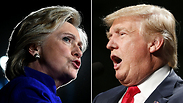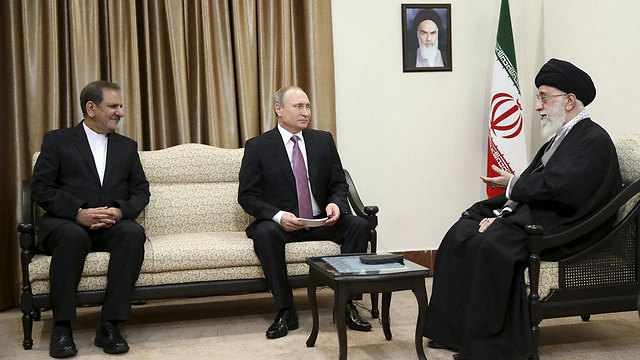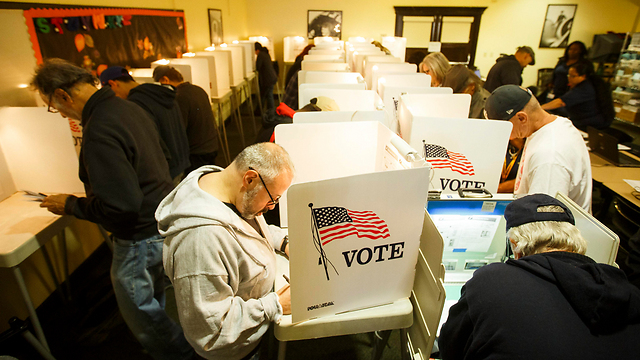
Arab World indifferent to US elections: Clinton is 'bad,' Trump is 'worse'
Analysis: Arab and Muslim rulers despise both American presidential nominees, and don't think either will want to 'get their hands dirty' in the Middle Eastern swamp. Iran's supreme leader Khamenei, however, prefers Trump, while a recent poll spanning 3,000 people in 18 Arab nations found 47% prefer Clinton, and only 9% support Trump.
On the one hand, the Arab world is busy with its own issues. On the other hand, the two presidential nominees in America have no vision or work plan. The Arab and Muslim rulers despise both of them: They don't believe the "bad" Hillary, and can't stand Trump, who is "even worse." It's hard to decide which of them would be a better president for the Arab world.
The Saudi newspaper Arab News recently published a poll—conducted in cooperation with an American pollster, and included over 3,000 respondents from 18 Arab nations. Most of the respondents (47 percent) said that if they were eligible to vote in the US, they wouldn't have bothered even going to the booths. Forty-four percent said they would've voted for Clinton, while Trump only garnered nine percent of support. Clinton is seen as someone with "vague" political and diplomatic experience, while Trump is seen as an "enigma."
Clinton's conduct with regards to the Israeli-Palestinian conflict, her inexplicable support of the Muslim Brotherhood in Egypt, the attack on the US Embassy in Benghazi, and the fact she turns a blind eye to the situation in Syria hardly inspire hope in the Arab world. According to Arab experts on American politics, neither Clinton nor Trump plan to "get their hands dirty" and sink into the swamp of regional conflict.
Surprisingly, it was Ali Khamenei, Iran's supreme leader, who volunteered to bet on a horse in this race. He is the only leader in the Muslim world to reveal his choice. He announced that Trump was the ayatollahs' preferred president due to the Republican nominee's implied desire to forge stronger ties with Russian President Putin. It's not difficult to understand: Khamenei and his close circle want to preserve the economic advantages of the nuclear deal, look for the nominee who won't send more American troops to Iraq and one who won't get in Tehran's way in establishing a "new order" in Lebanon following the election of Michel Aoun—who the Iranian Revolutionary Guard Corps views as a puppet.

The US elections come at a time when the Arab world is weakened and divided, self-absorbed, and feeling threatened. While hundreds of millions of Americans (including millions of exiles from the Arab world) go to the voting stations, the region marks the fifth anniversary of the "Arab Spring" revolutions. There isn't a single Arab ruler who isn't worried about losing their throne at the moment.
Three American officers were murdered in Jordan over the weekend, while in Egypt the currency dropped, prices of gas and sugar rose and terrorists murdered another senior officer. The gruesome death of fish vendor Mouhcine Fikri ignited protests in Morocco, while the Saudis are deliberating over how to continue economic sanctions against Egyptian President al-Sisi without letting his country crumble.
Prof. Uzi Rabi, the Director of the Moshe Dayan Center for Middle Eastern Studies at Tel Aviv University, released his new book "Back to the Future: The Middle East in the Shadow of the Arab Spring" over the weekend. Rabi analyzes the dramatic changes that led to the overthrow of four Arab tyrants in the last five years. But he offers no good news for the Israeli reader. He also doesn't offer solutions, but rather forces the reader to think outside the confines of old patterns, equipping him with a flashlight to illuminate the new regional order.
The administration in Washington made countless mistakes in its handling of the Middle East. There is almost no Arab nation that hasn't paid a heavy price—in human lives and in economic woes—because of the erroneous American policies. We saw how the American administration tried to force a foreign worldview of the concept of human rights on the Arab dictators. And when they failed to obey, we saw how Washington worked to remove them. What are the lessons Clinton should learn? What could prepare Trump? In the next two years, political analysts say, the new president is not going to be bringing any creative solutions to the table. This will open the door for Putin.












